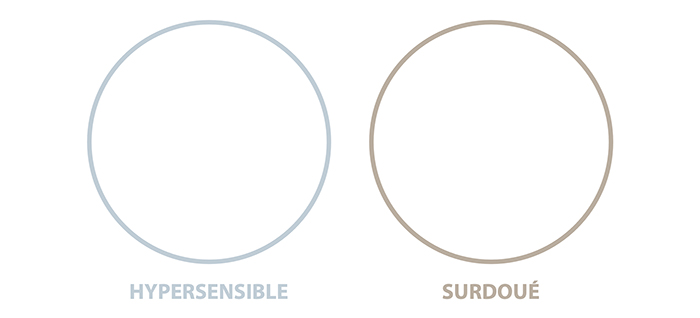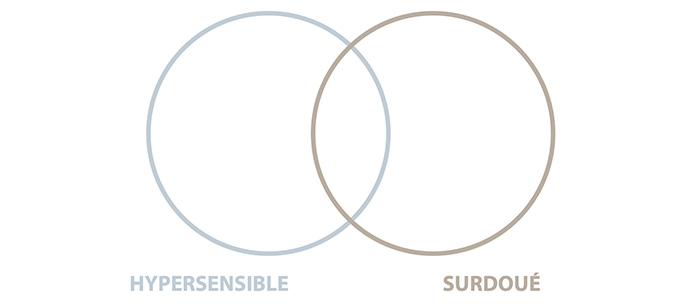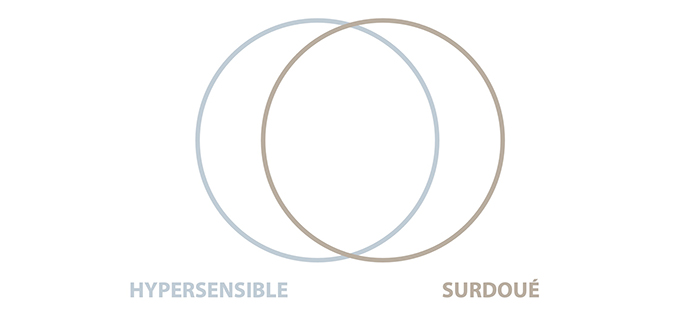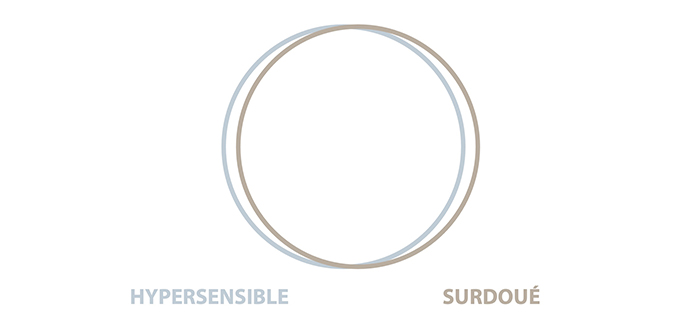Êtes-vous surdoué ou hypersensible ? J’ai fait cet article aujourd’hui parce que beaucoup de personnes se posent la question (et me la posent). En même temps c’est complètement normal parce que ce n’est pas toujours hyper évident. Donc on va voir aujourd’hui les différences entre l’hyper sensibilité et le fait d’être haut potentiel intellectuel.
Je m’appelle Paul et mon haut potentiel a été détecté il y a plus de dix ans maintenant. Et aujourd’hui je partage sur Connect The Dots ce que j’ai appris pour aider les petits nouveaux.
NB : cet article est la transcription de la vidéo ci-dessus
Les statistiques de l’hypersensibilité et du haut potentiel intellectuel
Avant d’aller plus loin je voulais vous donner quelques petites infos pour qu’on sache un peu de quoi on parle. Les personnes hypersensibles représentent 15 à 20% de la population. C’est là une estimation parce que ça n’a jamais été prouvé scientifiquement. On estime que c’est 15 à 20% de la population.
Concernant les surdoués, ils représentent 2,5% de la population selon les statistiques HPI. C’est plus ou moins une estimation. En fait ça vient du fait qu’on s’est dit que les quotients intellectuels (QI) étaient répartis selon la courbe normale de Gauss. La catégorie surdoué ça représente 2,5% de la population. Donc ça peut être plus, ça peut être moins.

Que ce soit l’hypersensibilité ou les surdoués, il s’agit vraiment d’accords. On s’est dit que c’était tant de pourcentage, mais on n’en est pas sûrs. Maintenant je vais essayer de vous donner rapidement les différences entre l’hypersensibilité et le fait d’être surdoué (que je peux appeler aussi parfois la douance, c’est le fait d’être doué, surdoué).
Les preuves que vous êtes hypersensible
Une personne hypersensible il faut la voir un peu comme une antenne qui capte les stimulations intérieures et extérieures. C’est à dire que c’est un grand capteur (on a un grand capteur, un grand récepteur) et toutes les stimulations (qu’elles soient intérieures ou extérieures) sont captées et enregistrées. Alors que le fait d’être surdoué c’est « simplement » une grande intelligence, le fait d’avoir un quotient intellectuel de plus de 130.
Maintenant pour les différencier, je vais vous donner quelques éléments.
La personne hypersensible a des émotions renversantes
Donc la personne hypersensible a d’abord des émotions renversantes. Elle a les émotions un peu comme un roller-coaster, des montagnes russes. Elle a des hauts et des bas tout le temps, parfois plusieurs fois dans la journée, plusieurs fois dans la même heure. Elle peut passer d’un très haut à un très bas en un rien de temps. Ce sont ses émotions qui ont tendance à la gouverner. C’est une personne très émotive et les autres ne comprennent pas forcément pourquoi elle est si émotive.
En fait, vu qu’elle capte certaines simulations intérieures plus que les autres, elle en capte que les autres ne captent pas. Du coup des fois elle va ressentir de la tristesse ou de la joie ou une autre émotion, alors que les autres ne le captent pas. C’est pour ça que parfois on peut dire des personnes hypersensibles que ce sont des personnes qui pleurent tout le temps, qui sont trop tristes, trop joyeuses, qui sont « trop » en fait. Elles sont « trop » tout. Ça vient de là, du fait que leur antenne capte plus d’émotions intérieures, plus de stimulations intérieures.
Les hypersensibles ont une grande sensibilité aux autres : l’empathie
Ensuite on a ce que j’ai et regroupé sous le nom de « sensibilité aux autres ». En fait c’est de l’empathie, et même de l’ hyper-empathie ! On a tendance à comprendre ce que les autres ressentent, et même à les ressentir. D’ailleurs ça a été prouvé scientifiquement (que les personnes hypersensibles ressentent physiquement les émotions des autres). Ils ont fait passer des personnes hypersensibles dans des IRM et leur ont montré des photos de gens qui avaient des émotions. Et physiquement les personnes hypersensibles avaient certaines zones du cerveau qui s’activent. Cela prouvait qu’ils ressentaient les mêmes émotions que les autres. Ça permet également d’être très doué (enfin plus ou moins doué) dans la communication parce qu’on a tendance à vraiment voir ce que l’autre ressent, à lire entre les lignes. Donc ça peut être utile quand même cette empathie.
Les hypersensibles ont une hypersensibilité sensorielle
Et enfin troisième caractéristique des hypersensibles : les 5 sens qui sont hyper-stimulés. C’est un peu l’hypersensibilité extérieure, sensorielle, qu’on verra parfois appelée sous le nom de hyperesthésie. En fait nos cinq sens (la vue, l’odorat, le goût, l’ouïe et le toucher) qui sont très sensibles. Alors ça ne veut pas dire qu’on entend mieux ou autre. On n’a pas de super-pouvoirs. Ça veut plutôt dire qu’on est vite dérangés par des petites odeurs, des petites sensations ou des petites choses qui ne vont pas forcément gêner les autres. Ça peut être une étiquette de vêtements par exemple. Tout le monde va la sentir mais chez certaines personnes (les hypersensibles) ça va être complètement ingérable. Ça va gratter, ça va être importable.
Moi j’ai beaucoup de mal avec les coutures de mes chaussettes. Si elles sont mal positionnées j’ai du mal à marcher. Il faut que j’enlève la chaussure, que je remette la chaussette et tout, un vrai bazar. Certaines odeurs ou la luminosité qui peut très vite éblouir. En fait ce sont ces stimulations extérieures qu’on capte et qui peuvent être vécues comme douloureuses.
Les preuves que vous êtes HPI
Ensuite on passe du côté du surdoué. Alors là il y a plein de choses pour le reconnaître mais j’ai essayé de les regrouper dans trois catégories.
Les surdoués ont un sentiment de décalage
Il y a d’abord le sentiment de décalage. En fait ce sentiment de décalage vient du fait qu’on a tendance à aimer les mêmes choses que les autres on a des goûts différents (enfin des intérêts et des passions différentes) parce qu’on aime être stimulé intellectuellement. Ce qui fait que l’on peut avoir du mal à se faire des amis surtout quand on est plus jeunes parce qu’on n’aime pas les mêmes choses que les autres. Et en parallèle le surdoué a aussi beaucoup de mal à comprendre les relations sociales parce qu’il a un esprit cartésien avec une certaine logique qu’il applique. Et des fois les relations amicales passent à travers cette logique. Du coup ça fait que le HPI ne comprend pas vraiment comment ça marche.
C’est pareil pour les relations amoureuses chez le haut potentiel. Le zèbre est un peu perdu. Ce sentiment décalage donc (qui est lié à ce dont je viens de parler) fait que le surdoué a tendance à mettre un masque social qui s’appelle le faux-self. C’est un peu comme une fausse personnalité et ça lui permet de mieux s’intégrer. Mais du coup les autres ne le connaissent pas vraiment parce que le surdoué « ment » un petit peu.
Le haut potentiel intellectuel est créatif
Le deuxième point est la créativité. Cette créativité est liée à deux choses. D’abord au fait que les personnes surdouées peuvent avoir tendance à plus utiliser leur cerveau droit (qui est plus créatif) et également au fait qu’ils ont une pensée arborescente (ou divergente selon la personne à qui on demande). Cette pensée arborescente fait que le surdoué pense à plein de choses très vite, tout le temps. Et vu qu’il pense à plein de choses il a tendance à trouver des nouvelles idées, et des idées qui sont créatives. C’est cette pensée vraiment continue qui va à fond plus le fait que le HPI est très cerveau droit qui fait qu’il est créatif.
Cette créativité aussi il faut l’exprimer. C’est à dire que, si possible, il faudrait essayer de trouver des jobs (ou des passions, des occupations) qui ont cet aspect créatif. Moi c’est ce que j’aime beaucoup avec ce blog parce que je crée des vidéos, je crée des articles, je créé un site, je créé un système. J’adore. Il y a cette notion de créer. Je ne dis pas qu’il faut être peintre, mais il faut avoir un aspect créatif.
Les HPI ont une extra-lucidité
Et enfin l’extra-lucidité. Ce n’est pas Madame Irma, mais c’est plutôt le fait que le surdoué comprend le monde et le voit comme il est. Le HPI a perdu le regard naïf de l’enfant, il le perd très jeune ce regard naïf d’enfant, et il voit le monde comme il est. Ça c’est une caractéristique assez propre des surdoués. Ça donne des personnes qui sont très terre-à-terre, qui peuvent être parfois cash et impulsives parce qu’ils n’y vont pas par 30 détours quoi. Ils foncent dans le tas et ont tendance à voir les choses telles qu’elles sont. Du coup à les dire telles qu’elles sont.

Alors encore une fois attention. Là j’ai fait des hyper-simplifications. Il y a plein d’autres signes, mais ce n’est pas possible d’en parler dans une seule vidéo. C’était vraiment pour vous donner un peu les différences. Donc l’hypersensibilité c’est très basé sur l’émotion, que ce soit des émotions internes des émotions externes, de nos cinq sens, et les émotions des autres. Alors que le surdoué ça se passe plutôt dans sa tête. C’est à dire qu’il pense, il regarde les choses, il analyse les choses.
Peut-on être surdoué et hypersensible ?
Alors maintenant petite question : est-ce que les surdoués, ou du moins tous les surdoués, sont hypersensibles ? Ou est-ce que les hypersensibles son surdoués ? Alors il y a un gros problème… c’est que on ne sait pas. Les chercheurs et les psychologues qui en parlent ont tous des théories différentes. Ce qui est sûr c’est que vu qu’il y a plus d’hypersensibles que de surdoués certains hypersensible ne sont pas HPI. Par contre est-ce que tous les surdoués, ou juste une partie des surdoués, sont hypersensibles ? Ça on ne le sait pas.




Il y a par exemple Jeanne Siaud-Facchin qui a tendance à dire que tous les surdoués sont hypersensibles et que ça fait partie des caractéristiques du surdoué. D’autres, par exemple Cathy Assenheim, disent que seul un surdoué sur cinq est aussi hyper sensible. Donc est-ce que c’est zéro ? Est-ce que c’est tous ? Est-ce que c’est quelque chose au milieu ? On ne sait pas pour le moment. Je vous laisse un peu vous faire votre petit avis sur la question selon votre propre ressenti. C’est cette idée que j’ai essayé de représenter là avec ces cercles. Est-ce que la zone au milieu (les personnes qui sont et surdouées et hypersensibles) est plus ou moins grande ? On ne sait pas.
Passez votre test d’hypersensibilité et votre test de HPI gratuit
Si vous voulez aller un peu plus loin dans la recherche de votre hypersensibilité et de votre douance, sachez que je vous fais passer en direct et si vous le voulez
Il vous suffit juste de vous rendre sur l’un ou l’autre de ces articles. À la prochaine !
